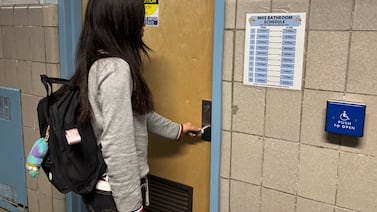Sign up for Chalkbeat Philadelphia’s free newsletter to keep up with news on the city’s public school system.
The chair of the City Council Education Committee has called off plans for public hearings on a controversial teacher discipline process in the Philadelphia school district, following what officials say is significant progress for the system’s efficiency.
The hearings would have focused on what’s formally called the reassignment room — but what’s commonly called the “rubber room” — for teachers accused of misconduct. Last year, Isaiah Thomas, the committee chair, said his concerns about the lack of transparency and costs related to the rubber room led him to request hearings about the process.
But at a joint press conference with Superintendent Tony Watlington on Tuesday, Thomas said he’s satisfied with how it’s changing and no longer thinks hearings are necessary, at least for now.
The rubber room is in fact a series of windowless rooms at the school district’s headquarters. Teachers who have been accused of misconduct are removed from their classrooms by the district and assigned to these rooms while the district investigates their cases. While they wait, teachers have reported catching up on reading, pursuing professional development opportunities, exercising, napping, or scrolling social media.
The first part of those investigations is supposed to take anywhere from 60 to 90 days, depending on the nature of the accusations, according to district policy. But some educators have claimed their investigations have dragged on for months or years with no resolution while teachers collect full pay.
There are some 75 people currently in the rubber room according to district spokespeople. That number is down from 84 in July 2024. Watlington said Tuesday the number is “fluid” as people move in and out of reassignment.
Watlington said at Tuesday’s press conference that the district has “overhauled” parts of its investigation process and has been able to clear 87% of the backlogged cases since July 2024 — ones that have been open for longer than the 60- to 90-day window. Of the 46 backlogged cases from last year, the district said it reduced those to six by January 2025.
District staff are more closely tracking the timelines of these cases, working with a new case management system, and are improving their transparency and communication with teachers in the rubber room, Watlington said.
“We’ve had a number of cases where individuals have been in that reassignment room process well beyond 90 days, and some were quite egregious,” Watlington said. “We’ve taken steps to clean all of that up.”
While most of the policies and practices that have allowed the district to clear many of those backlogged cases are not new, the district is now doing a “better job at adhering to them and having expectations that follow our policy procedures,” Watlington said.
Thomas said he was pleased with how the process has changed.
“We already see the difference,” Thomas said. “We already see more timely investigations. We see that it’s become more efficient.”
Still, both Watlington and Thomas said more work needs to be done to further improve the process. Watlington also confirmed that the district’s inspector general has been looking into the rubber room.
Thomas said Tuesday teachers in the rubber room have complained about a lack of communication regarding their cases, and that they often don’t know what they are accused of or how long they would be removed from their classrooms. Educators have reported feeling like they are in jail when sent to the rubber room.
Watlington said Tuesday the district has not hired any new staff to help work through the backlogged cases but is looking to fill two administrative roles to oversee the investigation process. The district currently has five people — including supervisors — responsible for investigating cases of teachers in the rubber room, Watlington said.
One of Thomas’ key reasons for demanding public hearings on the issue last year was to assess “how much money we’re wasting” by paying teachers’ full salary and benefits while they are in the rubber room while also paying substitutes to cover their classes.
Thomas said Tuesday it is “especially important to members of City Council” that the district work to improve their processes before seeking more funding.
Watlington said the district is analyzing how much the current process is costing the district but did not have a cost estimate available on Tuesday.
“I do not believe that every problem can be solved by more money and more people,” Watlington said.
Still, Thomas said he and his staff have talked to teachers in the rubber room and though they said they are “not necessarily satisfied” with their situations, they are “happy to see the progress that’s been made.”
The City Council had not put the planned hearings on its calendar before Tuesday.
The Philadelphia Federation of Teachers also said there is much more the district should be doing to reinstate teachers who are not found guilty of wrongdoing.
“Amid a district-wide staffing shortage, the absence of just one educator from our classrooms is one too many — especially in light of the fact that a majority of staff are eventually cleared of any misconduct,” said PFT President Arthur Steinberg in a Tuesday statement. “Even staff who are cleared are not returned to classrooms right away due to bureaucratic inefficiencies within the administration.”
For now however, Thomas said he will not be calling for hearings — “unless I change my mind.”
This story has been updated to amend the number of people currently in the rubber room upon receiving new information from the school district.
Carly Sitrin is the bureau chief for Chalkbeat Philadelphia. Contact Carly at csitrin@chalkbeat.org.






